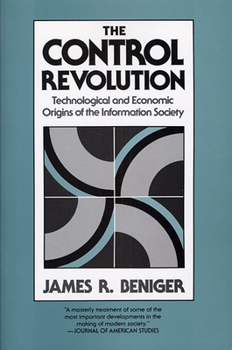The Control Revolution: Technological and Economic Origins of the Information Society
Select Format
Select Condition 
Book Overview
Why do we find ourselves living in an Information Society? How did the collection, processing, and communication of information come to play an increasingly important role in advanced industrial countries relative to the roles of matter and energy? And why is this change recent--or is it?
Format:Paperback
Language:English
ISBN:0674169867
ISBN13:9780674169869
Release Date:January 1986
Publisher:Harvard University Press
Length:508 Pages
Weight:1.55 lbs.
Dimensions:1.2" x 6.2" x 9.1"
Customer Reviews
5 ratings
Amazing
Published by Thriftbooks.com User , 21 years ago
The writer thoroughly researched his work. He studied how technology affects organizations and how crisis of information come into play when dealing with mass markets and new technologies. This is a must read work.
Outstanding book
Published by Thriftbooks.com User , 23 years ago
Beniger has published two sole-authored books. The Control Revolution: Technological and Economic Origins of the Information Society (Harvard University Press, 1986) gained a full-page review (with brief biography) in the New York Times Book Review and the lead review (and cover illustration) in the special book review edition of Science, journal of the American Association for the Advancement of Science. Now in its third printing, The Control Revolution won the eleventh annual Association of American Publishers award for "the most outstanding book in the social and behavioral sciences" and the Phi Kappa Phi Faculty Recognition Award; the 1989 softcover edition was selected by the New York Times Book Review as a "Notable Paperback of the Year." Recently Harvard University Press announced contracts to publish The Control Revolution in two additional languages: in Italian by UTET Libreria, an Italian book publisher, by December 1995; and in Mandarin Chinese by Laureate, a U.S. book publisher specialized in foreign translations for export, by May 1996.
Ground breaking, empirical work, cuts thru Info Society hype
Published by Thriftbooks.com User , 24 years ago
If you have, like Beniger, asked the question "Why is information so critical for our current mode of production? Why Information? Why Now?" You need to read this book.His basic argument is that the seeds of our contemporary information intensive society was sown way back during the start of the Industrial Revolution. In fact, information was critical to make the transition from feudal to industrial society. The reason being that the industrial revolution (entailing mechanization, steam power, assembly line etc.) speeded up the process of production to the extent that human beings on their own physical powers would be unable to keep up with the speed of production. In feudal/agricultural based societies, the production process was slow (i.e., ploughing using ox) and it remained in control of the individual. With the industrial revolution, the production process was speeded, resulting in what he terms as "a crisis of control." This reminds me a lot of the Charlie Chaplin movie "Modern Times." Don't know if you have seen it, if you have, you know exactly what I am talking about.In order to resolve the crisis of control emerging from the speeded-up production process, you need information. Example: Steam engine travels faster than a human being. How do you keep track of the train if you can't run faster than it? String telegraph line along the railway track connecting different stations along the way. When train reaches station, the station master informs the next station about the next estimated arrival time. Think about it, if you didn't have a schedule or an estimated time of arrival/departure, it would be impossible to operate a passenger train service or a goods service. Speed brings uncertainty which can only be resolved through the acquisition of information. Today, just-in-time production (epitomizing the heights of efficiency and speed) would not be possible without flow of information to control this process.This is a great book! Much recommended for people who would like to exercise their grey cells. WARNING: Business travellers nourished on Tofflerian hype may have indigestion!
Excellent book
Published by Thriftbooks.com User , 24 years ago
This is an excellent synthesis of great information from a number of different fields. I want to point out (for anyone reading these "reviews") that the person who gave this book only one star is actually referring to a book by another author. The two authors have books with similar titles. For that reason, I urge you to disregard that irrelevant ranking and read this excellent book for yourself.
This is a highly original work spanning many disciplines.
Published by Thriftbooks.com User , 25 years ago
Beniger has synthesized findings from scores of fields to produce a plausible and remarkably original view of economic change and commercial development in America. While some of his explanations are a bit murky and some of his linkages a bit half-baked, this a brilliant book. Nobody to my knowledge, saving perhaps only Alfred Chandler, has done a better job of explaining the evolution of administrative systems or the linkages between that evolution and the advances in information technology occuring in the 19th and early 20th centuries. I recommend this book to anyone with an interest in management control, competitive dynamics, or technological/economic history.I only wish the author had taken one more cut at simplifying and clarifing his basic thesis, It is also a pity that the volume was written prior to the development of transaction cost economics.




